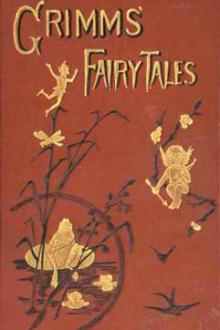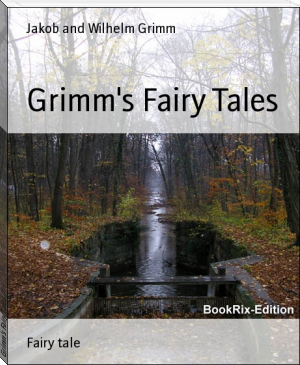Household Tales, Wilhelm Grimm [good books to read for women TXT] 📗

- Author: Wilhelm Grimm
- Performer: -
Book online «Household Tales, Wilhelm Grimm [good books to read for women TXT] 📗». Author Wilhelm Grimm
The animals again replied “Duks,” and everything happened just as it had happened the day before. The girl cooked a good meal, ate and drank with the old man, and did not concern herself about the animals, and when she inquired about her bed they answered, “Thou hast eaten with him, Thou hast drunk with him, Thou hast had no thought for us, To find out for thyself where thou canst pass the night.”
When she was asleep the old man came, looked at her, shook his head, and let her down into the cellar.
On the third morning the woodcutter said to his wife, “Send our youngest child out with my dinner to-day, she has always been good and obedient, and will stay in the right path, and not run about after every wild humble-bee, as her sisters did.” The mother did not want to do it, and said, “Am I to lose my dearest child, as well?”
“Have no fear,’ he replied, “the girl will not go astray; she is too prudent and sensible; besides I will take some peas with me, and strew them about. They are still larger than lentils, and will show her the way.” But when the girl went out with her basket on her arm, the wood-pigeons had already got all the peas in their crops, and she did not know which way she was to turn. She was full of sorrow and never ceased to think how hungry her father would be, and how her good mother would grieve, if she did not go home. At length when it grew dark, she saw the light and came to the house in the forest. She begged quite prettily to be allowed to spend the night there, and the man with the white beard once more asked his animals,
“Pretty little hen, Pretty little cock, And beautiful brindled cow, What say ye to that?”
“Duks,” said they. Then the girl went to the stove where the animals were lying, and petted the cock and hen, and stroked their smooth feathers with her hand, and caressed the brindled cow between her horns, and when, in obedience to the old man’s orders, she had made ready some good soup, and the bowl was placed upon the table, she said, “Am I to eat as much as I want, and the good animals to have nothing? Outside is food in plenty, I will look after them first.” So she went and brought some barley and stewed it for the cock and hen, and a whole armful of sweet-smelling hay for the cow. “I hope you will like it, dear animals,” said she, “and you shall have a refreshing draught in case you are thirsty.” Then she fetched in a bucketful of water, and the cock and hen jumped on to the edge of it and dipped their beaks in, and then held up their heads as the birds do when they drink, and the brindled cow also took a hearty draught. When the animals were fed, the girl seated herself at the table by the old man, and ate what he had left. It was not long before the cock and the hen began to thrust their heads beneath their wings, and the eyes of the cow likewise began to blink. Then said the girl, “Ought we not to go to bed?”
“Pretty little hen, Pretty little cock, And pretty brindled cow, What say ye to that?”
The animals answered “Duks,”
“Thou hast eaten with us, Thou hast drunk with us, Thou hast had kind thought for all of us, We wish thee good-night.”
Then the maiden went upstairs, shook the feather-beds, and laid clean sheets on them, and when she had done it the old man came and lay down on one of the beds, and his white beard reached down to his feet. The girl lay down on the other, said her prayers, and fell asleep.
She slept quietly till midnight, and then there was such a noise in the house that she awoke. There was a sound of cracking and splitting in every corner, and the doors sprang open, and beat against the walls. The beams groaned as if they were being torn out of their joints, it seemed as if the staircase were falling down, and at length there was a crash as if the entire roof had fallen in. As, however, all grew quiet once more, and the girl was not hurt, she stayed quietly lying where she was, and fell asleep again. But when she woke up in the morning with the brilliancy of the sunshine, what did her eyes behold? She was lying in a vast hall, and everything around her shone with royal splendor; on the walls, golden flowers grew up on a ground of green silk, the bed was of ivory, and the canopy of red velvet, and on a chair close by, was a pair of shoes embroidered with pearls. The girl believed that she was in a dream, but three richly clad attendants came in, and asked what orders she would like to give? “If you will go,” she replied, “I will get up at once and make ready some soup for the old man, and then I will feed the pretty little hen, and the cock, and the beautiful brindled cow.” She thought the old man was up already, and looked round at his bed; he, however, was not lying in it, but a stranger. And while she was looking at him, and becoming aware that he was young and handsome, he awoke, sat up in bed, and said, “I am a King’s son, and was bewitched by a wicked witch, and made to live in this forest, as an old gray-haired man; no one was allowed to be with me but my three attendants in the form of a cock, a hen, and a brindled cow. The spell was not to be broken until a girl came to us whose heart was so good that she showed herself full of love, not only towards mankind, but towards animals - and that thou hast done, and by thee at midnight we were set free, and the old hut in the forest was changed back again into my royal palace.” And when they had arisen, the King’s son ordered the three attendants to set out and fetch the father and mother of the girl to the marriage feast. “But where are my two sisters?” inquired the maiden. “I have locked them in the cellar, and tomorrow they shall be led into the forest, and shall live as servants to a charcoal-burner, until they have grown kinder, and do not leave poor animals to suffer hunger.”
170 Sharing Joy and Sorrow
There was once a tailor, who was a quarrelsome fellow, and his wife, who was good, industrious, and pious, never could please him. Whatever she did, he was not satisfied, but grumbled and scolded, and knocked her about and beat her. As the authorities at last heard of it, they had him summoned, and put in prison in order to make him better. He was kept for a while on bread and water, and then set free again. He was forced, however, to promise not to beat his wife any more, but to live with her in peace, and share joy and sorrow with her, as married people ought to do. All went on well for a time, but then he fell into his old ways, and was surly and quarrelsome. And because he dared not beat her, he would seize her by the hair and tear it out. The woman escaped from him, and sprang out into the yard, but he ran after her with his yard-measure and scissors, and chased her about, and threw the yard-measure and scissors at her, and whatever else came his way. When he hit her he laughed, and when he missed her, he stormed and swore. This went on so long that the neighbors came to the wife’s assistance. The tailor was again summoned before the magistrates, and reminded of his promise. “Dear gentlemen,” said he, “I have kept my word, I have not beaten her, but have shared joy and sorrow with her.” “How can that be,” said the judge, “when she continually brings such heavy complaints against you?” “I have not beaten her, but just because she looked so strange I wanted to comb her hair with my hand; she, however, got away from me, and left me quite spitefully. Then I hurried after her, and in order to bring her back to her duty, I threw at her as a well-meant admonition whatever came readily to hand. I have shared joy and sorrow with her also, for whenever I hit her I was full of joy, and she of sorrow, and if I missed her, then she was joyful, and I sorry.” The judges were not satisfied with this answer, but gave him the reward he deserved.
171 The Willow-Wren
In former days every sound still had its meaning and application. When the smith’s hammer resounded, it cried, “Strike away! strike away.” When the carpenter’s plane grated, it said, “Here goes! here goes.” If the mill wheel began to clack, it said, “Help, Lord God! help, Lord God!” And if the miller was a cheat and happened to leave the mill, it spoke high German, and first asked slowly, “Who is there? Who is there?” and then answered quickly, “The miller! the miller!” and at last quite in a hurry, “He steals bravely! he steals bravely! three pecks in a bushel.”
At this time the birds also had their own language which every one understood; now it only sounds like chirping, screeching, and whistling, and to some like music without words. It came into the bird’s mind, however, that they would no longer be without a ruler, and would choose one of themselves to be their King. One alone amongst them, the green plover, was opposed to this. He had lived free, and would die free, and anxiously flying hither and thither, he cried, “Where shall I go? where shall I go?” He retired into a solitary and unfrequented marsh, and showed himself no more among his fellows.
The birds now wished to discuss the matter, and on a fine May morning they all gathered together from the woods and fields: eagles and chaffinches, owls and crows, larks and sparrows, how can I name them all? Even the cuckoo came, and the hoopoe, his clerk, who is so called because he is always heard a few days before him, and a very small bird which as yet had no name, mingled with the band. The hen, which by some accident had heard nothing of the whole matter, was astonished at the great assemblage. “What, what, what is going to be done?” she cackled; but the cock calmed his beloved hen, and said, “Only rich people,” and told her what they had on hand. It was decided, however, that the one who could fly the highest should be King. A tree-frog which was sitting among the bushes, when he heard that, cried a warning, “No, no, no! no!” because he thought that many tears would be shed because of this; but the crow said, “Caw, caw,” and that all would pass off peaceably. It was now determined that on this fine morning they should at once begin to ascend, so that hereafter no one should be able to say, “I could





Comments (0)